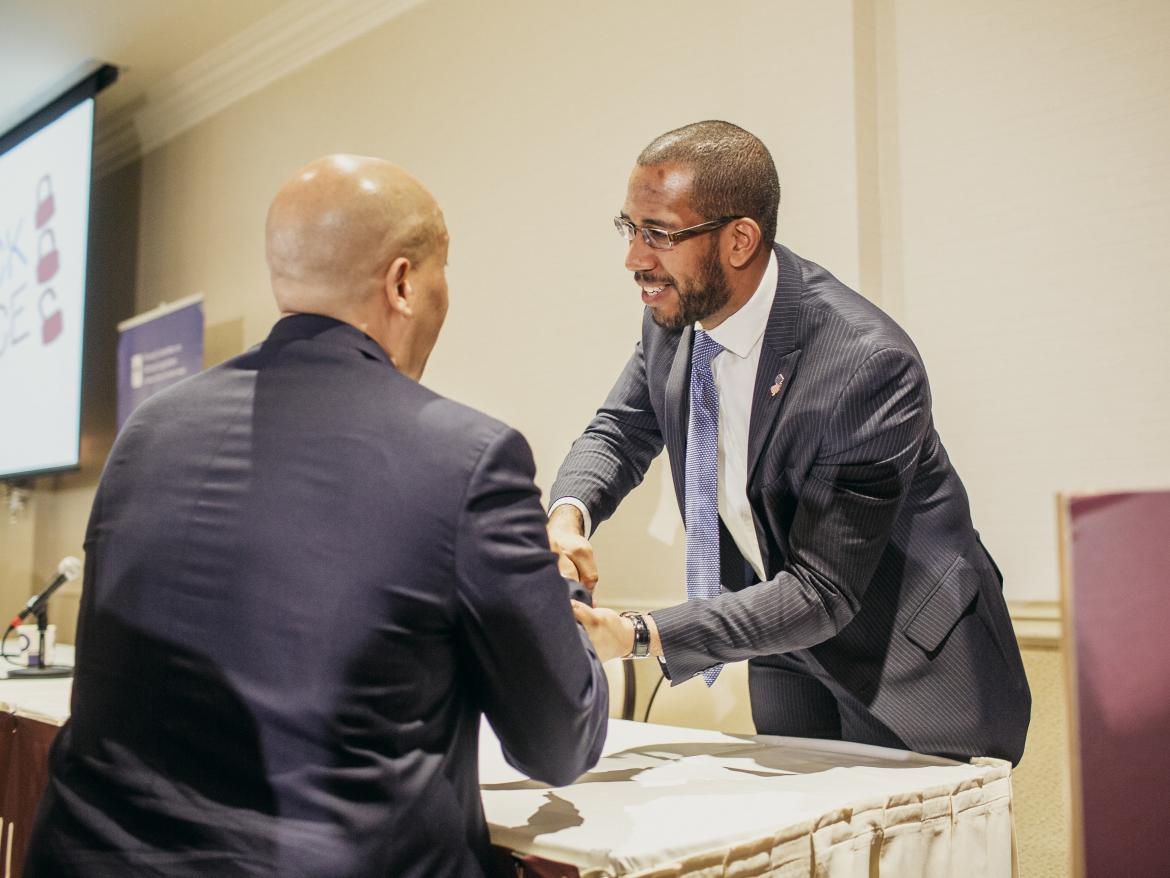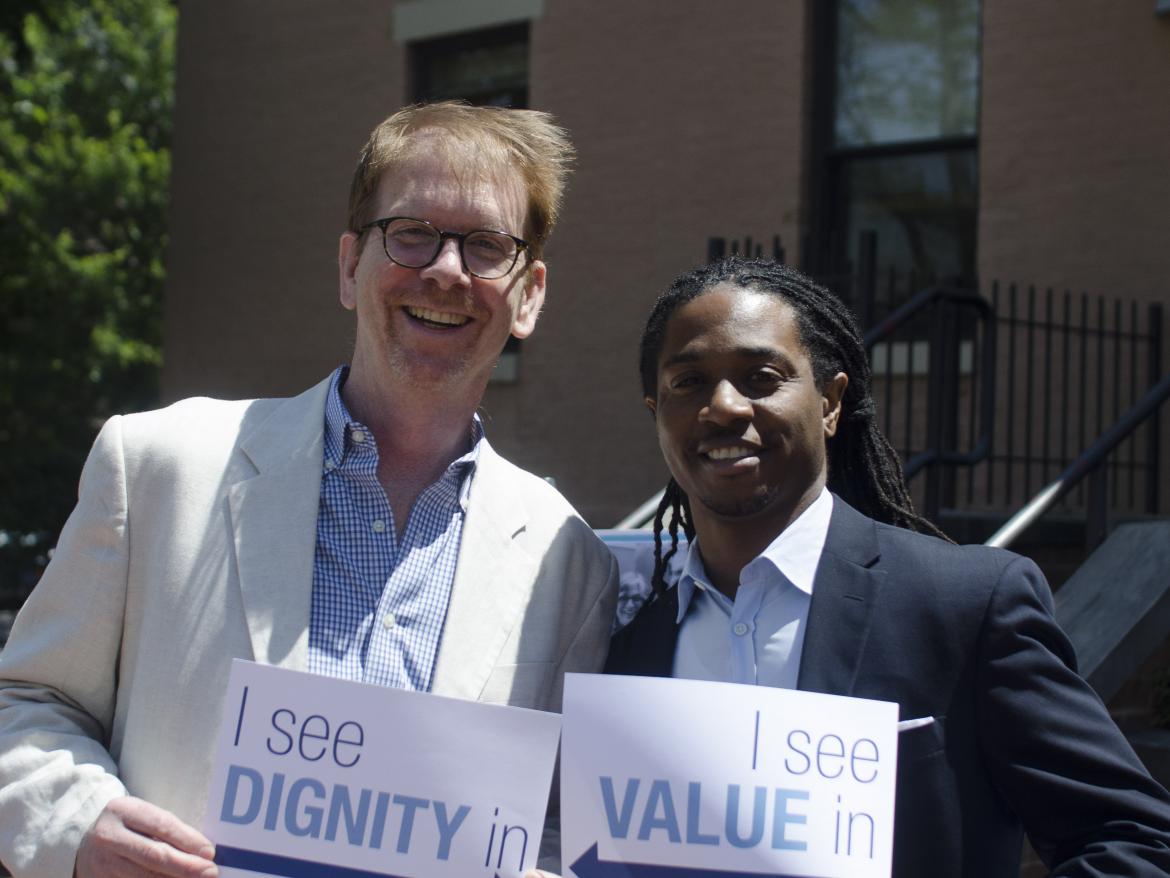The 2016 election manifested the deep political and social divisions in our country, revealing stark differences in voters’ hopes for the future. We see anger, fear, despair, resignation, sadness, and indifference across the political spectrum.
Some people are jubilant at the results of the election, looking for a return to a “law and order” leader. Many others are frightened of how the president-elect’s words and decisions will affect them. People across the world wonder how Mr. Trump’s policies will affect the global challenges of climate change, nuclear disarmament, peace, and human security. And far too many of our fellow citizens have given up believing that elected leaders or government can make the world better.
Mr. Trump is an untested political leader whose business operations raise ethical dilemmas. Many of his campaign statements counter FCNL values and priorities. He has appointed advisors and named nominees whose public records demonstrate religious intolerance, racial discrimination, and white nationalism.
We will continue to be powerful, persistent, and prophetic truth-tellers in the halls of power.
Whether the authoritarian, xenophobic rallying of his political campaign will translate into governance will be determined in part by how the president-elect and his cabinet lead. But our country’s next steps will also be influenced by Congress and the active engagement of those people who do not want to turn back time on the progress we have made for peace and civil rights.
We also have a new Congress whose leadership is pushing forward an agenda that would threaten health care for 22 million people, cut the programs that currently keep tens of millions out of poverty, and expand the budget for war. FCNL’s lobbyists in Washington and in our network across the country have strong relationships with lawmakers in both parties who are willing to push back against this agenda. It will require remaining focused and engaged, and we will need your help.
Amidst these political seismic shifts, FCNL’s grounding as a Quaker lobby and our presence on Capitol Hill as a nonpartisan voice for peace and justice are needed now more than ever.
In the weeks and months ahead, we will continue to be powerful, persistent, and prophetic truth-tellers in the halls of power, working to advance the world we seek. We will uphold and move forward the priorities our governing General Committee set for us when they met in November. We will recognize and affirm the many ways that people may be called to act for change — while remaining focused on our mission to work within our democratic system to influence national legislation.
We are under no illusions about the challenges ahead. The threats are real: to health care access, to protection from discrimination and violence, to our planet’s well-being, and to programs that build peace in our communities and around the world.
And yet, we must be open to the opportunities that could come in this changing political landscape. New champions for peace and justice will emerge, and we must be attuned to recognize and support them. The voices of those elected officials who will work cooperatively will be essential. Although Congress can move very slowly, it is not stagnant. With FCNL’s decades of experience in lobbying Congress, we are prepared to use all the approaches at our disposal to block bad policies and move good ones forward.
Strengthening Our Lobbying
As we look to the challenges ahead, three areas in particular will be important for us to draw on and continue to build in the coming months and years.
1) Effective lobbying by FCNL staff
How can we convince 51 senators to prevent repeal of the Affordable Care Act? Who are the champions who can stop a registry of Muslims in the United States from becoming a reality?
Our lobbyists work to ask and answer these kinds of questions. They are in congressional offices, learning about members’ plans and concerns, strengthening existing relationships and building new ones. And they are developing strategies — internally and in partnership with the many coalitions we work with or lead — that give us the best chance of moving our priorities ahead. We will continue to build on our long history of successfully weighing in on congressional decisions.
2) Persistent advocacy by people across the country
Two days after the election, more than 300 FCNL constituents were in Washington, DC to urge Congress to act on sentencing reform. Just this month, more than 150 people lobbied with us in state and district offices to set the stage for action in 2017.
The 18 young adults in FCNL’s Advocacy Corps brought 33 additional people into congressional offices in November alone, sharing stories and advocating for immigration reform. Their letters to the editor recently appeared in papers in Lafayette, LA; Corpus Christi, TX; Rome, GA; and Oklahoma City, OK.
In 34 communities, FCNL Advocacy Teams are supporting each other to work with their congressional delegations. Their efforts have led to at least 13 new cosponsors to criminal justice reform legislation this year, and the teams have built durable connections with their members of Congress through this persistent advocacy.
Our dedicated grassroots activists, trained and supported by FCNL staff, ensure that congressional offices regularly hear the voices of their constituents. Those voices will become even more critical in the months ahead. We encourage you to join us in advocacy.
3) Cultivating relationships for the long-term
At a time where people are building walls, literal and metaphorical, FCNL’s advocacy takes a different approach. We see each encounter with a member of Congress or their staff as a relationship-building opportunity – a chance to find points of connection that can encourage mutual respect, understanding, and openings for further conversation.
This kind of advocacy advances our policy goals, enabling FCNL lobbyists and advocates to meet with members of Congress that refuse to speak with our more partisan colleagues. This approach has helped us cultivate Republican champions committed to working on climate change. In Miami, FL, a constituent who had resisted meeting her representative because they couldn’t possibly agree discovered a personal connection through their adult children – and she helped convince her representative to act.
This determination to speak with every member of Congress, regardless of party affiliation or position, is the essence of who we are as a Quaker lobby. We may disagree with a person’s positions or actions, but we still recognize the spark of something divine in them. When we are able to, as the banner on FCNL’s building says, “#LoveThyNeighbor (No Exceptions),” we find unexpected openings and opportunities both to advance our priorities and live our values.
Working for peace and justice in this new political paradigm requires determination and engagement. “Success” may simply mean preventing the worst proposals from passing. We accept — some days more gracefully than others — that we can’t control every step of the movement towards change. As Executive Secretary Emeritus Ed Snyder wrote in 1993, “Cause and effect on matters of major national or international significance are nearly impossible to identify. Who can factor in mystery? synchronicity? amazing coincidence? the power of a cloud of witnesses? the moving of the Holy Spirit?”
And yet, we persevere, using the power endowed in our minds and hearts and bodies to act in a way that feels right in the depth of our being. We trust in that feeling, even if it doesn’t line up neatly with our strategies. Ed goes on to say, “Friends have been in the middle of some of the major issues of our time, following the Light that is given us.” Even as we lay plans and schedule lobby visits, we also heed the prophetic aspects of our work.
We will work with every fiber of our beings to oppose violent and hateful ideas and actions.
More than two centuries after our country’s founding, we are still figuring out how to live together with equality for all, not just some, and how to welcome those “yearning to be free.”
As his country stood on the brink of civil war, 150 years ago, President Abraham Lincoln spoke these words in his first inaugural address: “We are not enemies, but friends. We must not be enemies. Though passion may have strained, it must not break our bonds of affection. The mystic chords of memory will swell when again touched, as surely they will be, by the better angels of our nature.”
The perspective of our history and these words speak to us across the years and give us strength for what’s ahead. Today, we will work with every fiber of our beings to oppose violent and hateful ideas and actions. We will stand with those who are vulnerable and advocate tirelessly for policies that promote peace and justice. We will stay firmly grounded in our faith and in our common humanity and be touched by the better angels of our nature.



